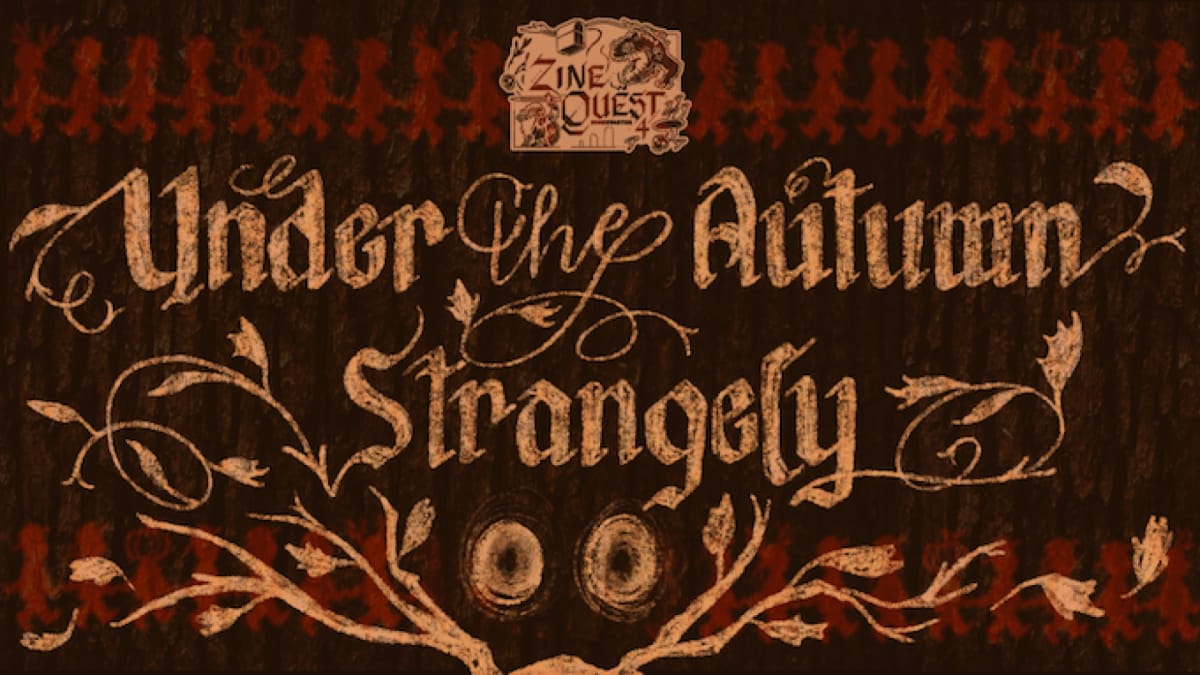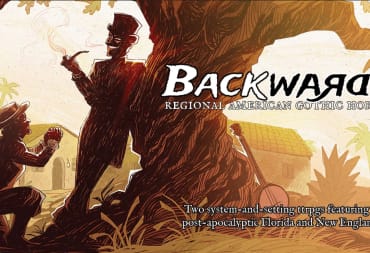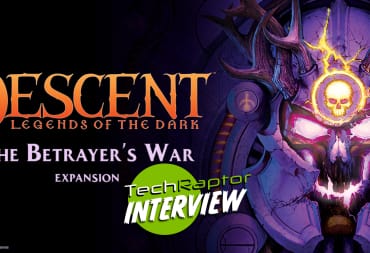Recently, I became aware of a Kickstarter project for a TTRPG called Under The Autumn Strangely. The campaign pitched it as a story of people exploring a landscape called the Never Was, a place seemingly unmoored from both time and reality. It was advertised as a small, specialized experience meant to invoke a timeless ethereal form of Pastoral horror. The promotional material and artwork express a romanticized ideal of rural Americana with warm colors and cheerful tunes, all with a slight unsettling undercurrent.
Then I saw the Kickstarter's current status. Under The Autumn Strangely's campaign goal was a modest $250. As the campaign concluded, it had $7,679 funded; that is more than thirty times the crowdfunding goal. It seemed that this very distinct experience had reached a much wider audience than the creator expected.
So I reached out to them. The creator of Under The Autumn Strangely is Graham Gentz, who has been quite prolific when it comes to board game projects. He has over 20 years of experience, contributing to multiple different creative endeavors including the comic book Wyrdspace, coordinating MegaGames for Vancouver's Shut Up and Sit Down Expos, as well as developing several smaller TTRPGs for 9 Level Games and the Ennie-award winning Level 1 Anthology series.
Over a series of e-mails, I corresponded with Gentz. Our discussion spanned various topics including Under The Autumn Strangely's inspirations, some of the unique design challenges and freedoms that come from such a singular experience, and how a work can just focus on a singular sensory experience to be greatly impactful.

Under The Autumn Strangely - The Comfort of Pastoral Horror
When asked when did Gentz first had the idea for Under The Autumn Strangely, their immediate first response was to praise the community of Zinequest. This is a publication where dozens of TTRPG creatives pitch novel or unique ideas bundled together in a digestible volume. These are the kinds of experiences that don't take up massive hundred page volumes on your bookshelf but the kind you can flip through in about ten minutes. Gentz talked about the different projects that were ambitious and experimental thanks to Zinequests' distinct format, which has helped garner a deeply passionate community, of which he is a member. Gentz cited several other works that helped shape the project including Robert Eggers' 2015 horror film The Witch as well as the storytelling-heavy TTRPG Savage Sister by Adriel Lee Wilson for its phenomenal use of tension and dread.
But arguably the largest inspiration for Gentz' project was the animated miniseries Over The Garden Wall, created by Patrick McHale and aired on Cartoon Network in November 2014. The show tells the tale of two young boys lost in a mysterious forest trying to find a way back home, their journey taking them through odd vignettes of 20th century rural lands accompanied by sights wonderous and horrifying. It was critically well-received thanks to some stellar voice-acting from the cast, memorable musical numbers, and sharp storytelling. It even won a Primetime Emmy for Outstanding Animated Program in 2015.
Despite this acclaim however, Over The Garden Wall isn't so much a beloved animated classic so much as it is a sleeper hit. There was some light controversy over the airing of the miniseries with some claiming that it was surprisingly dark for a show aimed at families. Alternatively, word of mouth has only continued to spread about the show's quality. For some, it has become a Halloween viewing tradition, placed happily in the rotation alongside the likes of The Nightmare Before Christmas, Coraline, and Hocus Pocus. In fact, its fanbase has generated its own share of theories about the series' many different elements which range from the importance of black turtles to the ultimate fate of the brothers the finale.
Even Gentz can't help but speculate about what is left in the show's margins. As for the idea of whether or not the miniseries was too dark or scary for young children, he did have a nuanced take on the matter:
A lot of my work over the years has been with kids- teaching, board and roleplaying games, general child care. Kids want to be listened to. They want to be taken seriously. And nobody likes to be talked down to. Over The Garden Wall is hardly the first spooky “kid horror” either. Anyone roughly my age will remember Scary Stories to Tell in the Dark with the devastatingly iconic art of Stephen Gammell. It’s not even the first Cartoon Network cartoon with one foot in the darkness. Courage the Cowardly Dog ran for 6 whole years and took some very big swings. And family or kid horror is certainly not a modern invention. Grimm’s Fairy Tales are especially, well. Grim. And they take from traditions of storytelling that are much, much older.
It is that particular emotional state that Under The Autumn Strangely attempts to invoke. A very particular brand of horror that isn't gratuitous or existential but feels almost timeless in its themes. It is why various ghost stories invoke the subgenre of “pastoral horror” since it holds not just sinister elements but warmth and humanity; the kind that make those stories fun and nostalgic to revisit as you get older.
For me, “pastoral horror” is about setting and place and time. The environment is doing the heavy-lifting and creation of that feeling. That’s why it’s so special and emotionally resonant.

Under The Autumn Strangely - The Process and The Portrayal
In fact, part of Gentz' creative process on Under The Autumn Strangely was creating a Spotify playlist. This is a key part of Gentz' creative process, going all the way back to their early days with TTRPGs. The second session he was a part of, Jason Mical's Fallout TTRPG, was done with music provided by several burned CDs. As such, making a playlist is just a part of the process, not unlike what professional Gms do while running more elaborate tables.
When I asked Gentz about this approach, as well as their extensive time working on RPGs, I wanted to know more about the skills he had developed while in those positions. The answer I got had more nuance than I expected.
I think everyone who enters into the TTRPG space is already becoming a designer. By engaging in collaborative play and storytelling, the line between audience member and participant present in virtually all other media is obliterated. The most common thing to hear when you ask someone about their game they’re running is that it's some form of “homebrew”! Although people seem to inherently understand they can and must tear apart their engine and rearrange to however they wish, in our current culture of Designer Board Games and Roleplaying Games, there is still a mystique and stratification I’m not wholly comfortable with. People can and should be encouraged.
The other part of that is the community. From Game Jams on Itch.io or the 200 Word RPG Challenge to smaller cons like the amazing Metatopia, people are listening and sharing with each other, and that is the beating heart of any community. Level 1 and 9th Level Games have been so generous and kind in their support. I simply would not be here without them.
Gentz is not wrong. It is why when you speak to a lot of veteran players of TTRPGs, the process can feel less like advanced academia and something closer to freeform jazz. It is why even prewritten modules are undeniably different experiences from group to group.

Under The Autumn Strangely - Tonal Shifts and Shared Experiences
But Gentz also understands that mutual consent is essential as well. A self-identified structuralist, Gentz emphasizes that an RPG should not just introduce the tools needed for the experience, but instruct players in their use. This isn't a game with regimented and static monster encounters and a GM that knows and adjudicates everything, it is a shared experience where you are encouraged to embrace the serendipitous and the surreal where everyone at the table has a chance to be the narrator.
I need the inhabited world to have slightly off-putting and hallucinogenic qualities, like giant turkeys or fish that fish. That requires a certain stream-of-consciousness and if you make everything canon or predictable, then very quickly you run into the Memorizing the Monster Manual problem, and the experience no longer becomes novel or strange. Thus the importance of tools and the described use of those tools.
It is in that last part that Under The Autumn Strangely's most unique mechanic was discussed. There are three different roles in this TTRPG: The Traveler, The Arcadian, and The Terror. Players can play multiple characters that fall into one of these three roles. The Travelers are the people completely foreign to The Never Was, the strangers that simply wish to return home. The Arcadian represents the denizens of this place; strange and foreign but not overtly hostile. Finally, The Terror is the dark and threatening force, one that sows suspicion and augurs Death.
The idea is that players can rotate between roleplaying these various elements throughout a session, applying a rock-paper-scissors element to various tonal shifts in the story. This allows players to steer the ship into darker or lighter territory as the comfort levels of the table allows. A scary or disturbing scene can easily shift to one of whimsy – the Pottsfield episode of Over The Garden Wall is a great example of this.
So broadly, I favor GMless or shared/rotating GM games. Part of this is tied into my distaste for power structures, like the designer thing, but also placing the facilitator on some kind of Gygaxian Tower “above” the other players. The other part is that I find these styles are the most satisfying to play since they teach or encourage creativity and collaboration within players and foster, I think, the best environment for an exciting and unexpected experience
.
The other “Ah ha!” I had was thinking about the nature of that collaboration-- or lack of it-- when players in a roleplaying game don’t agree on tone, style, stakes, anything that Safety Tools and conversations about intentionality create. I have so many personal experiences at tables where the players rebelled because the game was too dark, or an aggressive Dungeon Master tried to squeeze the PCs in little boxes because it was “their game”
Of course, getting this system to work is easier said than done. Allowing players to dictate the tone and flow of an experience sounds great on paper, but what happens when all players constantly choose the path of least resistance? In a more conventional TTRPG experience, one where the GM is the sole arbiter of challenge and stakes, escalating tension is easy. When in doubt, just crank the CR or tweak everything's stats behind the scenes. But when everyone has an equal chance at narration and shaping things, how those roles interconnect and interact is crucial.
Over The Garden Wall is so much more than just the creepy parts. And there are also countless other horror-horror TTRPGs made to create those experiences of helplessness or isolation, like the exceptional 10 Candles. My goal was to make a structure both capable of reflecting the personal taste of the players at their table, but also make the relational tools to highlight every piece as equally important and integral to the shared space being created.
This is where I think why Under The Autumn Strangely saw the success it had with its Kickstarter campaign. Many people have fond or even surreal experiences associated with the Autumn season, be it from a harvest festival, going to a carnival spookhouse, or even just bonding with relatives over the newest sports season.
Adding in that touch of the fantastic just makes the various elements all the more pronounced. The harvest has come in, people return to old haunts to reconnect only to witness them slowly change into something unrecognizable. The land seems to die with the falling of tree leaves and the fields now scoured; the bitter cold and darkness on the way. But while the mind wanders to matters macabre and unsettling, it's always tempered by the memory of a warm blanket, a roaring fire, or a hot drink in your hand.
The Kickstarter campaign for Under The Autumn Strangely has concluded, however late pledges via Backerkit will be implemented soon.
Have a tip, or want to point out something we missed? Leave a Comment or e-mail us at tips@techraptor.net












